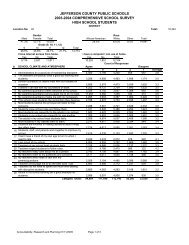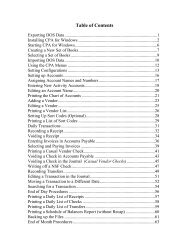exceptional child education - Jefferson County Public Schools
exceptional child education - Jefferson County Public Schools
exceptional child education - Jefferson County Public Schools
You also want an ePaper? Increase the reach of your titles
YUMPU automatically turns print PDFs into web optimized ePapers that Google loves.
Each ARC makes sure that results of vision, hearing, health, motor, and other screenings required for<br />
all <strong>child</strong>ren and youth are available and used in the decision-making process. In the event that<br />
screening information (e.g., vision, hearing, health, motor skills) required by the district for all<br />
<strong>child</strong>ren and youth is for any reason not available, such screenings are conducted prior to the ARC<br />
determining a suspected disability. All issues identified by failed screenings are resolved prior to the<br />
collection of other evaluation data, and any needed evaluation is conducted at no cost to the parent.<br />
All evaluations are administered in conformance with nondiscriminatory evaluation procedures.<br />
Failure of Referral to Support a Suspected Disability<br />
If the ARC decides that the referral does not support the possibility of the presence of a disability<br />
and, therefore, decides not to conduct an evaluation, the ARC documents the it’s decisions in the<br />
meeting summary.<br />
The ARC chairperson/district representative provides notice of the refused action (refusal to initiate<br />
the evaluation of the <strong>child</strong> or youth) to the parent. This notice (i.e., meeting summary) states the<br />
reason the <strong>child</strong> or youth is not eligible for evaluation services and includes the following:<br />
A. An explanation of why the ARC decided there is no reason to suspect that the <strong>child</strong> or<br />
youth has a disability;<br />
B. Options the ARC considered and reasons why the options were rejected;<br />
C. A description of each test, record, or report the ARC uses as a basis to refuse a full and<br />
individual evaluation; and<br />
D. A description of any other factors that are relevant to the ARC’s refusal.<br />
Determination That a Disability Is Suspected<br />
If the ARC determines that the <strong>child</strong> or youth has a suspected disability, the ARC:<br />
A. Documents the suspected disability or disabilities;<br />
B. Documents areas for evaluation related to the suspected disability or disabilities and any<br />
additional concern(s) documented in the referral;<br />
C. Provides written notice of the ARC’s decisions on the meeting summary according to<br />
procedures in Chapter 7, “Procedural Safeguards and State Complaint Procedures;” and<br />
D. Obtains written parental consent for the evaluation.<br />
The ARC members consider the disability definitions and eligibility criteria (See Chapter 1,<br />
“Definitions”, and Chapter 4, “Determination of Eligibility”) to determine which area(s) of disability<br />
most closely approximates the area(s) of concern identified on the referral and which disabilities<br />
may be eliminated. The ARC is not limited to considering just one disability area.<br />
The ARC uses the referral information and any other available information to determine the area(s)<br />
of suspected disability. (See “ARC Action” of this section.) A <strong>child</strong> or youth is assessed in all areas<br />
related to the suspected disability.<br />
If parental consent is not given, the ARC chairperson/district representative or designee contacts the<br />
8 3: Child Find, Eval, & Reeval

















